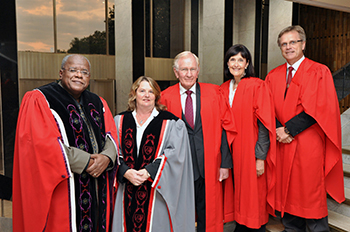Latest News Archive
Please select Category, Year, and then Month to display items
29 March 2022
|
Story Teli Mothabeng
|
Photo Supplied
![]() Philmon Bitso, Student Recruitment Officer, with the top-10 cohort of the class of 2021 Free State Star of Stars.
Philmon Bitso, Student Recruitment Officer, with the top-10 cohort of the class of 2021 Free State Star of Stars.
The Department of Student Recruitment Services at the University of the Free State (UFS) hosted its annual Free State Star of Stars competition at the Amanzi Private Game Reserve during the first week of March. The event saw some of the brightest young minds in the Free State inducted as UFS first-year students into this year’s top-10 cohort for the competition. This marks the first Star of Stars event since the beginning of the COVID-19 pandemic.
.jpg?Status=Master&sfvrsn=d7324e20_1)
This new cohort consists of a dynamic group of academically gifted students from Quintile 1-3 schools in the Free State who are currently enrolled for different UFS academic programmes, ranging from Medicine, Law, Education, and various Bachelor of Science courses. Many of these students had to overcome insurmountable challenges to perform as well as they did in their Grade 12 academic year and to become part of the top-10 cohort for the class of 2021. Due to the COVID-19 pandemic, the Department of Student Recruitment Services was forced to take a different approach to celebrate these deserving students; consequently, a weekend-long induction camp was the substitute for the annual gala dinner.
Apply for the 2022 Free State Star of Stars competition
The UFS realised the need to establish a platform that recognises and celebrates the diverse and, in most instances, difficult circumstances that disadvantaged schools (Quintile 1-3) are facing. Consequently, the Star of Stars competition was developed and established in 2016. This competition provides disadvantaged Grade 12 learners from all districts in the Free State an opportunity to showcase their excellence, while motivating them to aspire to achieve more.
Wrongful suffering must be compensated, Prof Johann Neethling argues
2016-04-20

From the left are Prof Jonathan Jansen, Vice-Chancellor and Rector, Prof Caroline Nicholson, Dean of the Faculty of Law, Prof Neethling, Prof Rita-Marie Jansen, Vice-Dean, and Dr Brand Claassen, Head of the Department of Private Law.
Photos: Stephen Collett
|
On 11 April, the Faculty of Law held the first of the year’s series of Prestige Lectures presented by Prof Johann Neethling, Senior Professor in the Department of Private Law. The event was attended by senior faculty members, the Dean of Law Prof, Caroline Nicholson, and the Vice-Chancellor and Rector, Prof Jonathan Jansen.
In his opening remarks, Prof Jansen said “Prestige lectures are at the heart of a university’s academic endeavour. It would serve the university community well to present them more often, as they go to the heart of important issues that affect society”
Prof Neethling made a compelling case for compensation for wrongful suffering by a child born with impairments. Since the mid-1960s, the actions of wrongful conception and wrongful birth have been recognised in South African law. Wrongful conception is defined as when a healthy child is born as a result of failed sterilisation or abortion, and wrongful birth is when a doctor fails to inform parents of a disability before the birth of their child.
“The reality is that a child born with impairments may indeed suffer (sometimes extreme) pain, loss of amenities of life, which would justify an award of damages,” he said.
So far, the action for wrongful suffering has been dismissed by the High Court and the Supreme Court of Appeal. However, he highlighted several cases where wrongful conception and wrongful birth was recognised by the courts.
“Why can the same approach (for wrongful conception and wrongful birth) not be followed in wrongful suffering claims by accepting that a disabled child seeks to address the consequences of its birth?” he asked.
Prof Neethling is regarded as one of the greatest minds in Private Law, not only in South Africa but in the African continent.
A festschrift, Essays in Honour of Johann Neethling (2015), with contributions from more than 50 of his peers around the world, was also launched at the lecture.